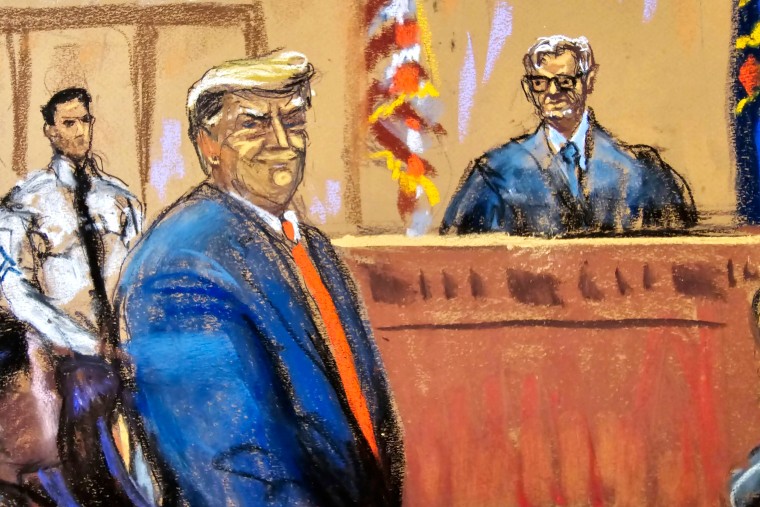[ad_1]
Jury selection continued Tuesday morning in the case of the People of the State of New York v. Donald Trump — the first criminal trial of a former president ever.
The quest to find a jury of 12 people and six alternates got off to a slow start Monday, as more than half of the 96 potential jurors summoned to the Manhattan courtroom said they couldn’t be “fair and impartial” when it comes to Trump, the polarizing New York native and former commander-in-chief.
That trend continued on Tuesday, with the first prospective juror of the day excused after suggesting he couldn’t be impartial because he’s from Texas, in finance and grew up around Republicans. “I believe I have some unconscious bias,” he said. A second juror was excused after telling the judge that she had done some thinking overnight and decided, “I can’t be impartial and unbiased.”
Several others were excused as well. Among those who did make it past the initial round of questioning was a man who works for a software company. The prospective juror said he followed Trump on Twitter when he was president and had read two of his books, including “The Art of the Deal,” which resulted in a big smile and nods from Trump. He said not discussing the case with his wife would be a challenge, but ultimately seemed to accept that not talking about the case is a condition of jury service.
Shortly before walking into the courtroom, Trump told reporters he had done nothing wrong and attacked Judge Juan Merchan, who is overseeing the trial, as “Trump-hating judge.” He also complained that the case is keeping him off the presidential trail: “I should be, right now, in Pennsylvania, in Florida, in many other states.”
Trump at first appeared to be animated and engaged in discussions with his lawyers, pointing in the air with a pencil to punctuate his response. But after about an hour, Trump was seen periodically leaning back and closing his eyes, only to shift his weight moments later. Later, he had his eyes closed and his head tilted to the left. It was unclear if he was sleeping. He had his eyes closed during some of Monday’s proceedings as well.
Trump, the presumptive Republican nominee for president, is required to be in attendance for the trial, which is projected to last six to eight weeks. He has pleaded not guilty to 34 counts of falsifying business records related to a hush money payment to a porn star during the closing days of the 2016 presidential election. The low-level felony is punishable by up to four years in prison.

Trump complained after court Monday that Merchan wouldn’t let him skip court May 17 to attend his son’s high school graduation, though Merchan has yet to actually rule on the request, saying he would do so later.
Trump’s attorney Todd Blanche also asked whether Trump could be excused on April 25, the date the U.S. Supreme Court is scheduled to hear his arguments about presidential immunity stemming from the federal election interference case against him. Merchan rejected that request after Blanche told him, “We shouldn’t be here at all right now.”
“You don’t believe you should be here right now?” the outraged judge responded. “He’s required to be here. He’s not required to be at the Supreme Court.”
The issues were some of the several raised by lawyers for both sides in court Monday that resulted in the jury selection process not beginning until the afternoon. Prosecutors asked that Trump be found in contempt and fined $3,000 for social media posts involving two key witnesses in the case, former Trump lawyer Michael Cohen and adult film star Stormy Daniels. Cohen has admitted to paying Daniels $130,000 towards the end of the 2016 campaign to keep her quiet about a sexual encounter she says she had with Trump in 2006. The records Trump is charged with falsifying stem from his repaying Cohen that money.
The DA’s office contends Trump’s posts violated his gag order in the case, and asked the judge in a filing made public Tuesday to warn him “that future violations of the Court’s restrictions on his extrajudicial statements can be punished not only with additional fines, but also with a term of incarceration of up to thirty days.”
By the end of the day Monday, only nine potential jurors answered questions from Merchan’s 42-question form — which included several questions about their political affiliations and views about Trump himself — before the end of the court day.
The remaining jurors from the first pool will continue answering questions Tuesday morning before prosecutors from the Manhattan district attorney’s office and Trump’s attorneys ask follow-up questions.
After that, they’ll move on to the next pool of 96. Merchan has estimated the process will take one to two weeks.



